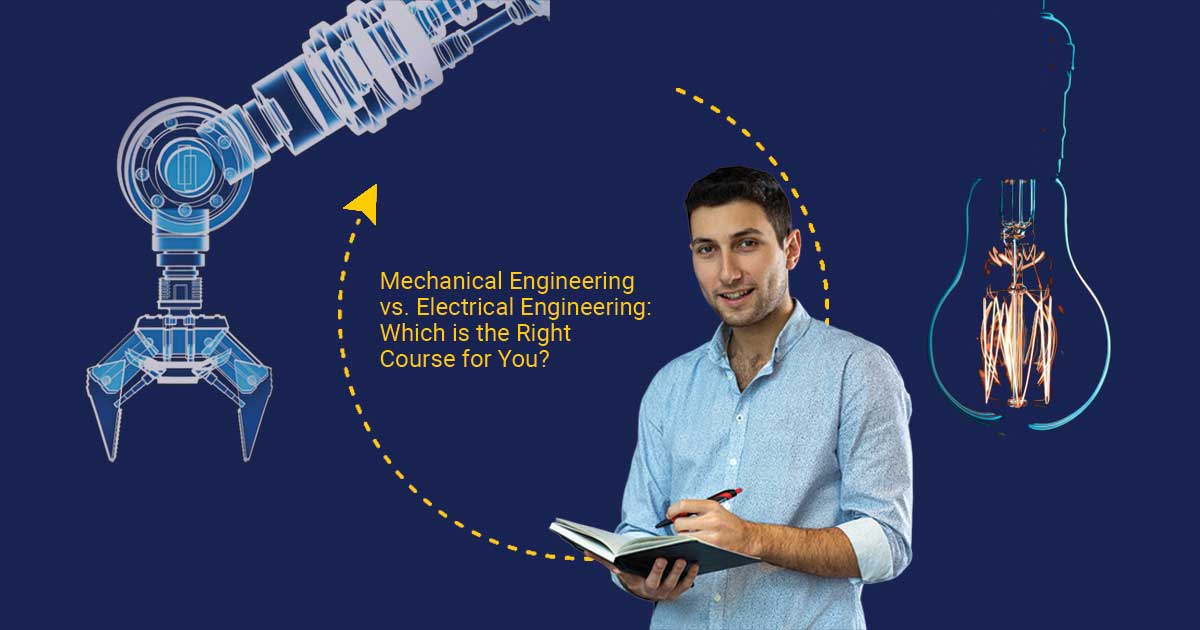FET Blogs


FET Blogs



20 October 2023
A survey by NASSCOM reveals that around 15 lac engineering students graduate every year in India. This data is a testament that engineering has been one of the popular career choices for Indian students for a long time. We can see the impact of engineering around us, starting from the creation of a satellite to the mechanics inside our smartphones. Engineering is one such field that always empowers the development and maintenance of all technological innovations that influence our daily existence. Its ever-increasing popularity in our daily lives makes engineering a great field to explore diverse careers.
Amidst a multitude of specialisations available to pursue in the field of engineering, one may wonder which is the right engineering for them. Most of the time, students might find themselves at a critical juncture trying to choose between two major engineering disciplines, viz., mechanical engineering and electrical engineering. If you are one of them, this article is just for you!
In this article, we shall delve into these two disciplines to help you determine the most suitable career pathway!
The undergraduate (UG) courses offered in mechanical engineering include a Bachelor of Engineering (B.E) in mechanical engineering and a Bachelor of Technology (B.Tech) in mechanical engineering. Both of these UG programmes have a course duration of 4 years, further divided into 8 semesters. You can pursue post-graduation by opting for a Master of Engineering (M.E) or a Master of Technology (M.Tech) in the same field, which is a 2-year course split across 4 semesters.
The UG programmes offered in electrical engineering include a B.E or B.Tech in electrical engineering. Both of these courses span 4 years, further divided into 8 semesters. To pursue higher education, you can opt for an M.E or M.Tech in electrical engineering, which is a 2-year course divided into 4 semesters.
Pursuing a mechanical engineering degree provides you with expertise in the intricacies of designing, analysing, producing, and maintaining mechanical systems and components. You also develop an understanding of mechanics, materials, thermodynamics, and fluid dynamics. Besides theoretical exposure, the curriculum also nurtures practical learning through internships, onsite project visits, experiments, and so on. The core subjects included in a mechanical engineering curriculum include:
On the other hand, electrical engineering fosters expertise in circuit design, control systems, digital electronics, and signal processing. You will learn to work with software for simulation and programming microcontrollers for embedded systems. Just like mechanical engineering, this course also exposes you to practical learning through experiments, internships, and projects. The core subjects included in an electrical engineering curriculum include:
After completing their mechanical engineering degree, graduates can discover attractive employment prospects in diverse sectors, such as aerospace, automotive, and renewable energy industries. Employers will highly value their abilities and proficiency in designing and creating products like engines, HVAC systems, turbines, and mechanical components for a wide range of applications. Let us see some of these career prospects in the field of mechanical engineering:
Industries today need experts who can design and develop electrical systems and electronic devices in this rapidly evolving business landscape. Therefore, after graduation, you can find rewarding career opportunities in the fields of electronics, telecommunications, computer hardware, and others. Let us see some of these career prospects in this domain:
To summarise, both the fields of mechanical and electrical engineering offer ample career advancement opportunities. However, you must choose the path after assessing their area of interest and future aspirations. While electrical engineering demands strong mathematical skills and an interest in computer programmes, mechanical engineering emphasises calculus and trigonometry. Hence, if you have a curiosity to learn about electricity and electronics and better knowledge of physics, a profession in electrical engineering could be the perfect fit. Alternatively, if you are inquisitive about understanding the functioning of vehicles, media devices, or robotics, then embarking on a career in mechanical engineering is the most suitable decision!
A1. The eight types of innovation are:
A2. Design-led innovation places the user at the heart of the process. It emphasises empathy, user experience, and problem-solving. The idea is to guide product or service design based on user needs and behaviours.
A3. Incremental innovation means making small, continuous improvements to existing products, services, or processes. The changes are evolutionary, not revolutionary.
A4. Five leading technologies driving change in engineering are:
A5. The ten types of business model innovation include:
Popular Post
17 February 2026
AIE Full Form
10 February 2026
AEIE Full Form
22 January 2026
AE Full Form
16 January 2026
What is Aerospace Engineering?
16 January 2026
What is Chemical Engineering?
Ask an Expert for Free